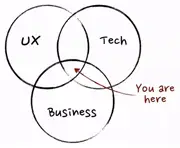What exactly does a product manager role entail?
As the domestic internet industry continues to grow and flourish, more and more international students and returnees are beginning to explore and pursue roles related to product management. So, what exactly does a product manager role, which is favored by returnees, entail?
In fact, the term "product" is a relatively broad concept, and traditional product roles are generally divided into areas such as product development, product management, product design, and product operations.
In our previou blog posts, Aniday has covered the different Product Manager titles, and classified them into different categories. Therefore, these classifications will not be discussed here, and this article will primarily focus on explaining the most common product manager role.
What Is a Product Role?

The term first appeared with the abbreviation PM, coined by P&G (Procter & Gamble) as Product Manager. This role was established because Procter & Gamble wanted one person to be responsible for an entire brand.
A product is created to address a specific user problem and is an integrated entity of functionality and services.
With the development of the role and changes in the industry, it can sometimes be challenging to define what exactly product work involves. However, if represented using a Venn diagram, it is a role situated at the intersection of user experience, business, and technology.
This also implies that, for roles related to products, your work will revolve around these three aspects.
From another perspective, product managers play a role in the evolution of technology and business, bridging the gap between user needs and technological innovation. Therefore, whenever new, more specialized user needs and advanced technology emerge, a dedicated role is needed to align these factors, clarify requirements, drive progress, and achieve goals.
The product manager role can be broken down into "product" and "manager."
-
"Product" refers to the company's business, which can include a website, app, service, physical item, or even a project or plan.
-
"Manager" refers to the job responsibilities, where the responsibility is for the product in question.
In general, this role is responsible for the entire product lifecycle based on the company's strategy.
What Product-Related Roles Are There?
As mentioned at the beginning of the article, product development, design, management, and operations, to some extent, all fall under product-related roles.
However, based on a company's internal role classification for products, product roles are typically divided into:
Different companies may have slightly different setups for product roles, but for recent graduates, it usually starts with positions like product assistant or product specialist.
At the same time, one person does not handle every aspect of a product entirely. With the increasing complexity of product features and the growth in the number of users, you may find that each feature corresponds to a different product manager.
Responsibilities of a Product Role

First and foremost, it's important to clarify that a product manager is not equivalent to a product owner, and it doesn't mean you can do things entirely your way.
Most of the time, a product manager exercises executive authority, coordinating different departments and resources to complete work tasks at various stages of the product's lifecycle.
The requirements and job responsibilities for product roles differ for different types of products and their stages.
For example, in the early stages of a product, you need to quickly build the core features, identify the core user groups, and rapidly validate the product model and market feedback.
As the product matures and faces a large number of users, the focus shifts to improving user experience and enhancing product details.
The job responsibilities also differ between consumer-facing (C-end) products and business-facing (B-end) products.
Generally, to work on a product, you need to be involved in various stages, from early user research and mid-stage product design and development to late-stage product testing and launch. All these activities fall within the responsibilities of a product role.
But as a company expands, these tasks get divided into more specialized roles. For example, market research roles take on user research responsibilities, development roles handle feature development, and operations teams manage user feedback.
So, many new product practitioners may think that their daily tasks involve creating various prototypes and writing documents, as well as monitoring development progress. However, creating prototypes and writing documents are basic skills of a product role and do not fully define the role's responsibilities.
As dedicated professionals responsible for ensuring products are completed and launched on time, the responsibilities of a product role include listening to user needs, defining and planning products, and making a series of responsible decisions to ensure smooth collaboration across departments.
This is why it's often said that a product manager is like another CEO within the company, underscoring the importance of the role's responsibilities.
In Summary
In the ever-evolving landscape of the domestic internet industry, the role of a Product Manager stands as a pivotal nexus, connecting user experience, business acumen, and technological innovation.
This blog post delves into the essence of what it means to be a Product Manager and why it's often likened to being the CEO of a product. We've explored the dynamic responsibilities that span the entire product lifecycle, adapting to the stage and nature of the product. As the industry grows and diversifies, understanding the multifaceted nature of this role becomes increasingly crucial.
It is not just about creating prototypes and documents; it's about orchestrating user needs, defining products, and making strategic decisions to ensure seamless collaboration across departments. This underscores the significance of Product Managers as indispensable leaders within their organizations.
Aniday's HR Services
Headhunting Service
Find and recruit quality candidates in just 1 week! Supported by 40,000 experienced headhunters in IT, Finance, Marketing… capable of recruiting in any region.
Headhunting Service ➔Employer of Record (EOR) Service
On behalf of your business, we recruit employees and handle payroll without the need to establish a company in markets such as Vietnam, Singapore, Malaysia, India, Indonesia…
Employer of Record (EOR) Service ➔
